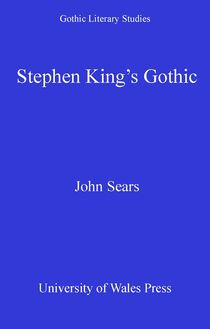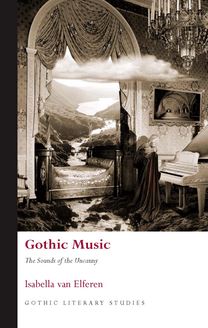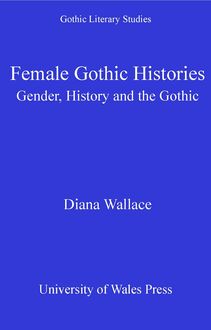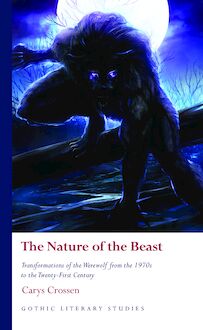-
 Univers
Univers
-
 Ebooks
Ebooks
-
 Livres audio
Livres audio
-
 Presse
Presse
-
 Podcasts
Podcasts
-
 BD
BD
-
 Documents
Documents
-
- Cours
- Révisions
- Ressources pédagogiques
- Sciences de l’éducation
- Manuels scolaires
- Langues
- Travaux de classe
- Annales de BEP
- Etudes supérieures
- Maternelle et primaire
- Fiches de lecture
- Orientation scolaire
- Méthodologie
- Corrigés de devoir
- Annales d’examens et concours
- Annales du bac
- Annales du brevet
- Rapports de stage
La lecture à portée de main
Vous pourrez modifier la taille du texte de cet ouvrage
Découvre YouScribe en t'inscrivant gratuitement
Je m'inscrisDécouvre YouScribe en t'inscrivant gratuitement
Je m'inscrisEn savoir plus
Vous pourrez modifier la taille du texte de cet ouvrage
En savoir plus

Description
Middle Eastern Gothics is the first scholarly volume on Gothic literature from the Middle East and North Africa (MENA). Its nine chapters consider literary expressions of the Gothic in the major Middle Eastern languages – Arabic, Hebrew, Persian and Turkish. Spanning the Maghreb, the Arabian Peninsula, Iraq, Iran, Turkey, Egypt and Palestine, the book makes a case for the transnational region – a cohesive geographic space encompassing diverse cultures, languages and histories that parallel, intersect or overlap – as a crucial locus of Gothic Studies, alongside the nation, the globe or the hyper-local. Across the MENA region, the Gothic helps express ongoing literary negotiations with modernity, leaving its distinctive mark on representations of globalisation, colonialism and nationalism. At the same time, Middle Eastern literary texts expand the boundaries of the mode on their own terms, refracting broad histories through local and indigenous forms, figures and narratives that we might associate with the Gothic.
Acknowledgements
List of Illustrations
Notes on Contributors
Notes on Transliteration
Introduction: (Re-)Orienting the Gothic - Karen Grumberg
Part I. Tracing the Gothic in Middle Eastern Literatures
1. Maqāmāt: Towards the Middle Eastern Gothic of the War on Terror - Jacob Berman
2. The Iranian Gothic and its Parts - Michael Beard
Part II. Spectralised Modernities
3. Gothicising the Ottoman Past and Building Modern Turkey in Turkish Novels of the 1920s - Tuğçe Bıçakçı Syed
4. Revival and Decay: On the Politics of Gothic Ambivalences in Modern Hebrew Literature - Roni Masel
5. Efendi Gothic: A Forgotten Prehistory of the Arabic Novel - Alexandra Shraytekh (Chreiteh)
6. The Call of Kimya: Re-Writing Sufi Ghosts in Ahmet Ümit’s The Dervish Gate - Adriana Raducanu
Part III. Violence, Catastrophe, Trauma: Gothic Literalised
7. Saharan Gothic: Desert Necrofiction in Maghrebi and Middle Eastern Desert Literature - Brahim El Guabli
8. ‘Well-Founded Fear’: Dead Narrators, Displaced Authors in Iraqi Gothic Fiction - Federico Pozzoli
Sujets
Informations
| Publié par | University of Wales Press |
| Date de parution | 15 décembre 2022 |
| Nombre de lectures | 0 |
| EAN13 | 9781786839305 |
| Langue | English |
Informations légales : prix de location à la page 0,4400€. Cette information est donnée uniquement à titre indicatif conformément à la législation en vigueur.
Extrait
MIDDLE EASTERN GOTHICS
SERIES PREFACE
Gothic Literary Studies is dedicated to publishing groundbreaking scholarship on Gothic in literature and film. The Gothic, which has been subjected to a variety of critical and theoretical approaches, is a form which plays an important role in our understanding of literary, intellectual and cultural histories. The series seeks to promote challenging and innovative approaches to Gothic which question any aspect of the Gothic tradition or perceived critical orthodoxy. Volumes in the series explore how issues such as gender, religion, nation and sexuality have shaped our view of the Gothic tradition. Both academically rigorous and informed by the latest developments in critical theory, the series provides an important focus for scholarly developments in Gothic studies, literary studies, cultural studies and critical theory. The series will be of interest to students of all levels and to scholars and teachers of the Gothic and literary and cultural histories.
SERIES EDITORS
Andrew Smith, University of Sheffield
Benjamin F. Fisher, University of Mississippi
EDITORIAL BOARD
Kent Ljungquist, Worcester Polytechnic Institute Massachusetts
Richard Fusco, St Joseph’s University, Philadelphia
David Punter, University of Bristol
Chris Baldick, University of London
Angela Wright, University of Sheffield
Jerrold E. Hogle, University of Arizona
For all titles in the Gothic Literary Studies series
visit www.uwp.co.uk
Middle Eastern Gothics
Literature, Spectral Modernities and the Restless Past
edited by Karen Grumberg
© The Contributors, 2022
All rights reserved. No part of this book may be reproduced in any material form (including photocopying or storing it in any medium by electronic means and whether or not transiently or incidentally to some other use of this publication) without the written permission of the copyright owner except in accordance with the provisions of the Copyright, Designs and Patents Act. Applications for the copyright owner’s written permission to reproduce any part of this publication should be addressed to the University of Wales Press, University Registry, King Edward VII Avenue, Cardiff CF10 3NS.
www.uwp.co.uk
British Library Cataloguing-in-Publication Data
A catalogue record for this book is available from the British Library.
ISBN 978-1-78683-928-2
eISBN 978-1-78683-930-5
The rights of the Contributors to be identified as authors of this work have been asserted in accordance with sections 77 and 79 of the Copyright, Designs and Patents Act 1988.
The publisher has no responsibility for the persistence or accuracy of URLs for any external or third-party internet websites referred to in this book, and does not guarantee that any content on such websites is, or will remain, accurate or appropriate.
C ONTENTS
Acknowledgements
List of Illustrations
Notes on Contributors
Notes on Transliteration
Introduction: (Re-)Orienting the Gothic Karen Grumberg
Part I Tracing the Gothic in Middle Eastern Literatures
1 Maqāmāt : Towards the Middle Eastern Gothic of the War on Terror Jacob Berman
2 The Iranian Gothic and its Parts Michael Beard
Part II Spectralised Modernities
3 Gothicising the Ottoman Past and Building Modern Turkey in Turkish Novels of the 1920s Tuğçe Bıçakçı Syed
4 Revival and Decay: On the Politics of Gothic Ambivalences in Modern Hebrew Literature Roni Masel
5 Efendi Gothic: A Forgotten Prehistory of the Arabic Novel Alexandra Shraytekh (Chreiteh)
6 The Call of Kimya: Re-writing Sufi Ghosts in Ahmet Ümit’s The Dervish Gate Adriana Raducanu
Part III Violence, Catastrophe, Trauma: Gothic Literalised
7 Saharan Gothic: Desert Necrofiction in Maghrebi and Middle Eastern Desert Literature Brahim El Guabli
8 ‘Well-Founded Fear’: Dead Narrators, Displaced Authors in Iraqi Gothic Fiction Federico Pozzoli
Notes
A CKNOWLEDGEMENTS
The idea for this volume was born of a conversation with Sarah Lewis, Head of Commissioning at the University of Wales Press, at the International Gothic Association conference at Lewis University in Romeoville, Illinois, in the summer of 2019. From the start, Sarah’s support and enthusiasm have sustained this project as it moved from idea to reality. I am grateful for her encouragement, and for the hospitable critical milieu afforded by Gothic studies for a volume like this one. I would like to thank Jamila Davey, whose sharp eye ensured consistency in the volume’s transliteration of Arabic terms, titles and names. Special thanks go to my exceptional research and editorial assistant, Maddie Lacy. Her perspicacity and composure have been integral throughout this process. I also would like to acknowledge the anonymous peer reviewers, scholars in the relevant literary traditions, whose feedback and evaluations of the chapters in this book were invaluable. For their wisdom, sound advice and help working through myriad challenges, I am grateful to Adriana X. Jacobs at the University of Oxford and Michael Allan at the University of Oregon, as well as to my colleagues in the Department of Middle Eastern Studies at the University of Texas at Austin: Dena Afrasiabi, Hina Azam, Emily Drumsta, Avigail Noy, Jeanette Okur, Na’ama Pat-El, Esther Raizen, Babak Tabarraee and Levi Thompson. I am fortunate to work alongside scholars so committed to the languages, literatures and intellectual heritage of the Middle East.
L IST OF I LLUSTRATIONS
Figure 1. Title page of Ḥayim Naḥman Bialik’s poem ‘Mete midbar’ (‘Dead of the Desert’), by Ira Jan, in Bialik, Shirim (‘Poems’) (Krakow: Fisher, 1908).
Figure 2. Illustration accompanying Ḥayim Naḥman Bialik’s poem ‘Mete midbar’ (‘Dead of the Desert’), by Ira Jan, in Bialik, Shirim (‘Poems’) (Krakow: Fisher, 1908).
N OTES ON C ONTRIBUTORS
Michael Beard is an Emeritus professor of English at the University of North Dakota. He has written extensively on contemporary Persian and Arabic literatures. He was co-translator, with Adnan Haydar, of a collection of poems by the Syrian-Lebanese poet Adonis, Mihyar of Damascus, His Songs (Rochester: BOA Editions Ltd, 2008), which won the Lois Roth Award for translation in that year. He co-edits the Middle East Literature in Translation series for Syracuse University Press. His book Sadeq Hedayat’s The Blind Owl as a Western Novel (Princeton University Press, 1990), which deals extensively with the Gothic genre, has recently been translated into Persian.
Jacob Rama Berman is an associate professor of English at Louisiana State University who specialises in the intersections of American literature and Islamic, Arab and Arab-American culture. His first book, American Arabesque: Arabs and Islam in the Nineteenth-Century Imaginary (New York University Press, 2012), deploys English-language and Arabic-language source material to analyse the influence of Arab and Islamic references on the formation of American national identity. His current project, Neither Here Nor There: The War on Terror’s Other Fictions , focuses on the representation of trauma in fiction written in both English and Arabic about the war on terror. Through categories such as cannibal democracy, zombie citizenship and PTSD poetics he locates an aesthetic lingua franca that disrupts the either/or political rhetoric of the war on terror and reconfigures national narratives through international contexts. Dr Berman has published scholarly articles on the Arab-American mahjar , Edgar Allan Poe, shipwreck narratives and contemporary Arabic literature. He also writes for the Los Angeles Review of Books and recently contributed an essay to the Denver Art Museum’s catalogue for the upcoming show ‘Near East to the Far West: French Orientalism and the American Frontier’.
Brahim El Guabli is assistant professor of Arabic studies and comparative literature at Williams College. His forthcoming book is titled Moroccan Other-Archives: History and Citizenship after State Violence (Fordham University Press). He is completing a second book entitled Saharan Imaginations: Between Saharanism and Ecocare . He is co-editor of two forthcoming volumes: Lamalif: A Critical Anthology of Societal Debates in Morocco During the ‘Years of Lead’ (1966–1988) (Liverpool University Press); and Refiguring Loss: Jews in Maghrebi and Middle Eastern Cultural Production (Pennsylvania State University Press). His articles have appeared in PMLA , Arab Studies Journal , The Cambridge Journal of Literary Inquiry and the Journal of North African Studies , among others
Karen Grumberg is the Arnold S. Chaplik professor in Israel and diaspora studies in the department of Middle Eastern studies and the programme in comparative literature at the University of Texas at Austin, where she directs the Center for Middle Eastern Studies. She is the author of Place and Ideology in Contemporary Hebrew Literature (Syracuse University Press, 2011) and Hebrew Gothic: History and the Poetics of Persecution (Indiana University Press, 2019). Her article ‘Queer Gothic Narratives of Palestine in Alon Hilu’s The House of Rajani and Ayman Sikseck’s Tishrin ’ is forthcoming in The Edinburgh Companion to Globalgothic . In 2020, she edited a special feature of Poe Studies: History, Theory, Interpretation on ‘Poe and the Middle East’. She currently serves on the advisory board of Poe Studies and on the editorial board of Shofar: An Interdisciplinary Journal of Jewish Studies .
Roni Masel is assistant professor of comparative literature at the University of California, Berkeley, specialising in Hebrew and Yiddish literatures and modern Jewish history. Her work has appeared in the Journal of Modern Jewish Studies , Studies in Yiddish and Prooftexts: A Journal of Jewish Literary History . She is currently completing a book manuscript, titled Bad Readers: Misreading, Mistranslation, and Other Textual Malpractices in Hebrew and Yiddish , which explores Jewish literatures in Eastern Europe from the perspective of reading
-
 Univers
Univers
-
 Ebooks
Ebooks
-
 Livres audio
Livres audio
-
 Presse
Presse
-
 Podcasts
Podcasts
-
 BD
BD
-
 Documents
Documents
-
Jeunesse
-
Littérature
-
Ressources professionnelles
-
Santé et bien-être
-
Savoirs
-
Education
-
Loisirs et hobbies
-
Art, musique et cinéma
-
Actualité et débat de société
-
Jeunesse
-
Littérature
-
Ressources professionnelles
-
Santé et bien-être
-
Savoirs
-
Education
-
Loisirs et hobbies
-
Art, musique et cinéma
-
Actualité et débat de société
-
Actualités
-
Lifestyle
-
Presse jeunesse
-
Presse professionnelle
-
Pratique
-
Presse sportive
-
Presse internationale
-
Culture & Médias
-
Action et Aventures
-
Science-fiction et Fantasy
-
Société
-
Jeunesse
-
Littérature
-
Ressources professionnelles
-
Santé et bien-être
-
Savoirs
-
Education
-
Loisirs et hobbies
-
Art, musique et cinéma
-
Actualité et débat de société
- Cours
- Révisions
- Ressources pédagogiques
- Sciences de l’éducation
- Manuels scolaires
- Langues
- Travaux de classe
- Annales de BEP
- Etudes supérieures
- Maternelle et primaire
- Fiches de lecture
- Orientation scolaire
- Méthodologie
- Corrigés de devoir
- Annales d’examens et concours
- Annales du bac
- Annales du brevet
- Rapports de stage




















